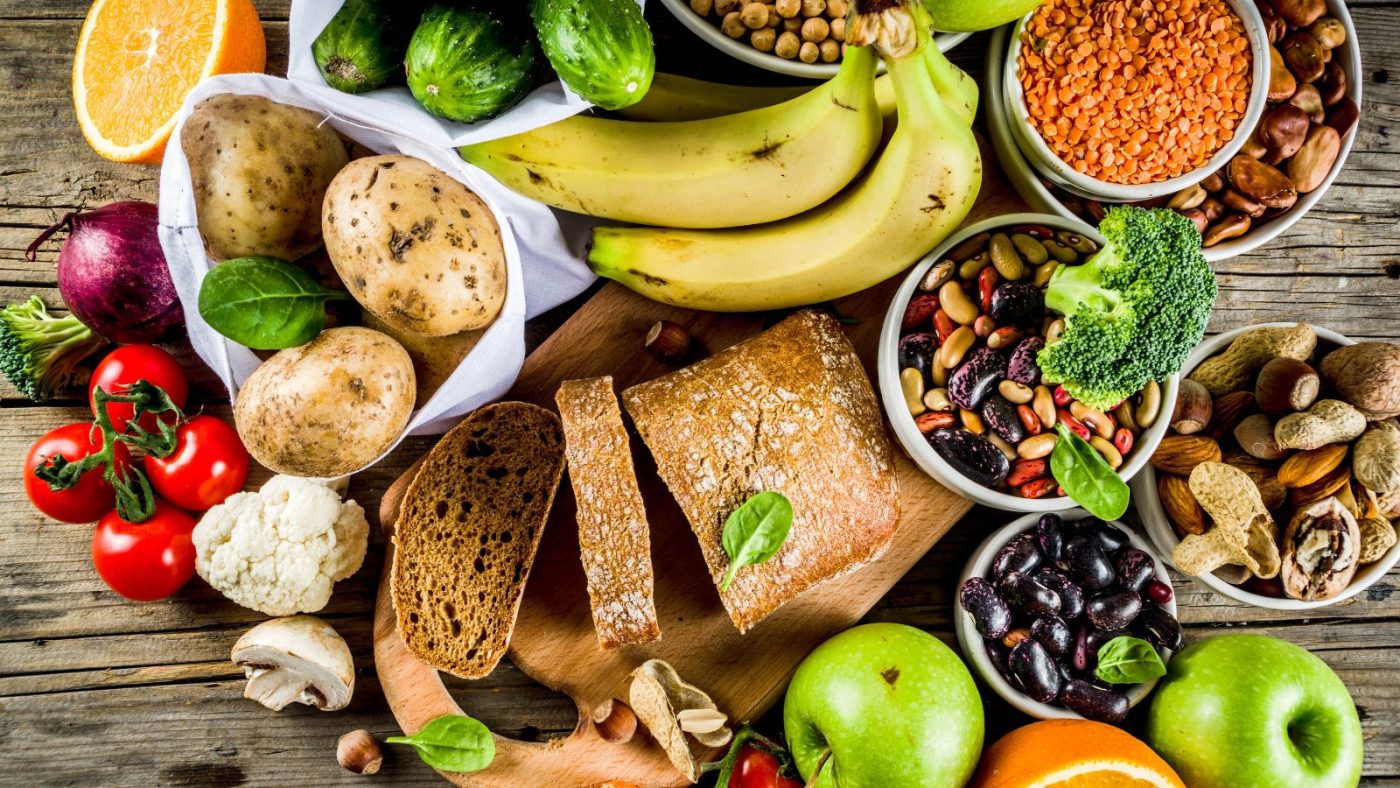Weight Management
Losing weight with the right diet: what do I need to look out for?
A new year often means new resolutions and goals. For many people, health is one of the main topics of the list of good resolutions, especially when it comes to losing weight. The start of a new year provides a perfect opportunity to strive for a healthy lifestyle and rethink your eating habits. If you're one of those who have resolved to lose weight this year and live a healthier life overall, then you've come to the right place. In this blog article, we'll share some valuable nutrition tips that can help you achieve your goals and make the most of the new year. Let's take a look together at how conscious eating habits and a clear plan can pave your way to a healthier lifestyle.
The following five tips are intended to guide you through the steps you can take to boost fat burning and get closer to your weight loss goal:
1. Adjust the needed amount of calories for your weight loss goal ✅
As with any diet plan, the power and total metabolic rate must first be calculated for the goal of losing weight. Losing weight is only possible if the body receives appropriate signals in the form of a calorie deficit. At the same time, it should be supplied with sufficient protein and important nutrients. To achieve this, it is recommended to consume approx. 300-500 calories less per day than the body needs according to the calculated total metabolic rate [1].
2. Determine the different importance of macronutrients ✅
Protein - the module of muscles 💪
An adequate protein intake plays a crucial role in losing weight, as proteins offer numerous benefits for the body. Firstly, proteins support muscle maintenance during a calorie-reduced diet. When losing weight, there is a risk that the body will not only lose fat, but also muscle mass. Proteins help to counteract this loss by strengthening and repairing the muscles. Secondly, proteins provide a long-lasting feeling of satiety, which can help to control appetite and prevent cravings. This makes it easier to stick to a low-calorie diet. Protein should therefore be the main component of the diet. The German Nutrition Society (DGE) recommends a daily protein intake of 0.8 g per kg of body weight for adults aged 19-65. From the age of 65, there is also an increased requirement of 1.0 g per kg of body weight. Regular exercise of five or more hours per week can even increase the daily protein requirement to 1.2-2.0 g per kg of body weight, depending on the level of physical activity [2,3].

Carbohydrates - the energy source for your workout 🌾
Carbohydrates play an important role in a balanced diet, also if you want to lose weight. They are the body's preferred source of energy and are crucial for the brain function and nervous system. Cutting out carbohydrates can lead to a lack of energy, tiredness and difficulty concentrating. Carbohydrates also influence blood sugar levels and the feeling of satiety. Choosing complex carbohydrates, which are found in whole grain products, vegetables and legumes, provides a long-lasting source of energy and helps to prevent cravings. When eating a balanced diet while losing weight, it makes sense to consciously choose the amount and type of carbohydrates consumed in order to regulate the overall energy balance and provide the body with the necessary nutrients. In addition you should avoid simple carbohydrates such as those found in ready-made products or sweets, as these only provide a short-term feeling of satiety.
The reference value for a carbohydrate intake is 260 g per day, of which only 90 g should be covered by simple carbohydrates (sugar). This results in a requirement for complex carbohydrates of around 170 g per day. However, carbohydrate intake also varies depending on physical activity. When your carbohydrate storages are depleted, your body switches go fat reserves as an energy source instead: a first step towards weight loss success [4,5,6].
Fats - the driver of performance 🥑
Fats are also an important part of any diet, but they are often neglected, partly because the "fat makes you fat" myth, which has been disproved for years, is still firmly anchored in many people's minds. However, fats have several important functions that influence performance. For example, they serve as an efficient source of energy, are crucial for hormone production (including testosterone) and are important for building muscle cells.
We often consume the wrong fats and too much of them. When it comes to muscle definition, quality comes before quantity. Unsaturated fatty acids such as those from vegetable oils (linseed oil, olive oil), fish (cod, salmon), avocado or walnuts are particularly suitable [7,8].
3. Eat consciously by preparing small portions ✅
It is advisable to keep control of portion sizes to regulate calorie intake. Eat consciously and stop when you feel full to avoid overeating. In addition, sticking to regular meals is crucial to keep blood sugar levels stable and prevent cravings. The option of smaller, more frequent meals can help to keep energy levels balanced and maintain a feeling of fullness throughout the day. These conscious eating habits can not only help you to better control your calorie intake, but also create a healthy and sustainable basis for your weight loss goal [9].

4. Drink enough water ✅
A sufficient intake of liquid, especially in the form of water, plays a crucial role in a successful weight loss process. You should therefore consume around 1.5 liters of calorie-free or low-calorie drinks per day.
Drinking enough water has several benefits for those who want to lose weight. Firstly, water can help prevent false hunger cravings, as thirst is sometimes mistaken for hunger. Consistent hydration can ensure that you are hydrated and not unnecessarily consuming calories through snacking when the body actually needs fluids [10,11].

5. Set yourself realistic goals and be patient when implementing them ✅
Patience and realism are fundamental qualities you should bring to the table when it comes to the weight loss process. It is important to understand that changing your body composition takes time and continuous commitment. Weight loss is a complex process that does not happen overnight. It is therefore crucial to set realistic goals while accepting that long-term results take time.
People often tend to look for quick fixes or radical approaches that promise to enable significant weight loss in the shortest possible time. However, these short-term measures are often not permanent and can also have negative effects.
By setting realistic goals, you can concentrate on small, steady progress and focus on long-term changes. It's important to realize that the road to weight loss requires not only physical, but emotional adjustments as well. A positive attitude and a willingness to commit to the long process are crucial.
It can be helpful to set small milestones and celebrate successes to maintain motivation. Weight loss is not just a physical change, but also a journey of self-discipline and self-acceptance. By combining patience, realism and a step-by-step approach, you can embark on a healthy and sustainable weight loss journey. 🖤
Literature:
[1] https://www.kalorienbedarf.de
[2] Higher protein intake during caloric restriction improves diet quality and attenuates loss of lean body mass – Ogilvie – 2022 – Obesity – Wiley Online Library
[3] König D, Carlsohn A, Braun H, Großhauser M, Lampen A, Mosler S, Nieß A, Schäbethal K, Schek A, Virmani K, Ziegenhagen R, He- seker H: Proteins in sports nutrition. Position of the working group sports nutrition of the German Nutrition Society (DGE). Ernahrungs Umschau 2020; 67(7): 132–9
[4] Deutsche Gesellschaft für Ernährung: DGE-Position, Richtwerte für die Energiezufuhr aus Kohlenhydraten und Fett. Bonn (2011). https://www.dge.de//fileadmin/dok/wissenschaft/positionen/DGE-Positionspapier-Richtwerte-Energiezufuhr-KH-und-Fett.pdf
[5] https://www.apotheken-umschau.de/krankheiten-symptome/diabetes/ernaehrung/kohlenhydrate-es-ist-komplex-817553.html
[6] Verordnung (EU) Nr. 1169/2011 des europäischen Parlaments und des Rates vom 25. Oktober 2011betreffend die Information der Verbraucher über Lebensmittel (ABl. L 304 S. 18, 22.11.2011), zuletzt geändert durch die Verordnung (EU) 2015/2283 vom 25. November 2015 (ABl. L 327 S. 1, 11.12.2015)
[7] https://www.dge.de/gesunde-ernaehrung/dge-ernaehrungsempfehlungen/dge-ernaehrungskreis/oele-und-fette/
[8] https://www.verbraucherzentrale.de/wissen/lebensmittel/gesund-ernaehren/ernaehrungspyramide-ausgewogene-ernaehrung-leicht-gemacht-72062
[9] https://www.verbraucherzentrale.de/wissen/lebensmittel/gesund-ernaehren/ernaehrungspyramide-ausgewogene-ernaehrung-leicht-gemacht-72062
[10] https://www.dge.de/fileadmin/dok/gesunde-ernaehrung/ernaehrungsempfehlung/kreis/Wasser_trinken_-_fit_bleiben.pdf
[11] https://www.verbraucherzentrale.de/wissen/lebensmittel/gesund-ernaehren/ernaehrungspyramide-ausgewogene-ernaehrung-leicht-gemacht-72062




















